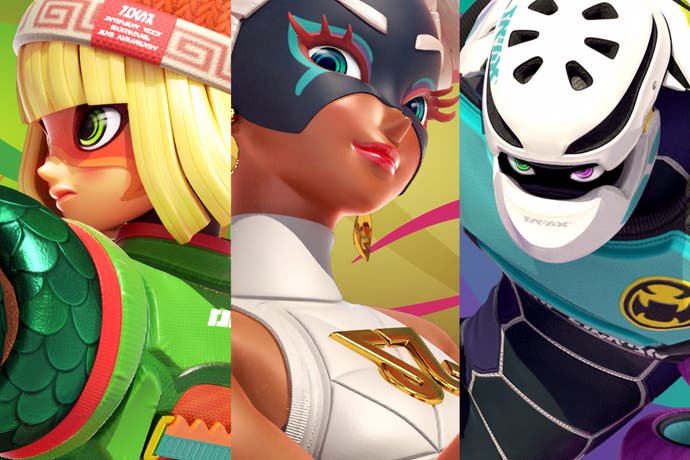Arms at length: The big Nintendo interview
Kosuke Yabuki on the future of Mario Kart, luck versus skill and Birdo. Wait, who's Birdo?
It has become known, to those in thrall to Nintendo's all-new fighting game Arms, as the Yabuki combo.
It's a move best pulled off at cover star Spring Man's home arena, lined as it is with backboards. Throw another fighter against one of them and they'll bounce off, tossed into a looping arc that opens up the perfect opportunity for a well-timed juggle. Pop your rush meter at the right moment and deal out the maximum punishment in one of the most devastating combos discovered so far.
The Yabuki combo takes its name from Arms producer Kosuke Yabuki, who debuted the move as he took on the winning player in the Arms Invitational at this year's E3. Since then, players have been emulating the combo, with Twintelle player DKL performing it at 2GGC's Arms Saga, the first major competitive event for the game, and with fans taking to YouTube to demonstrate how it's done while triumphantly screaming 'Yabuuuuuuki'.
Yabuki has become something of a cult figure amongst fans ever since he was thrust into the limelight at this year's E3 - and breaking out into Min Min's winning pose after pulling off the now famous combo certainly did his popularity no harm. He's also part of the new generation that's been placed at the forefront of a Nintendo that has, in the wake of the success of 2015's Splatoon, been keen to place an emphasis on its younger talent.
Not that he's new to Nintendo, though. Yabuki's tenure stretches back for well over a decade, beginning with a spell working under Eiji Aonuma for The Legend of Zelda: Twilight Princess before he moved to work alongside Mario Kart creator Hideki Konno on the series, a spell that began with Mario Kart Wii before Yabuki took on the director role for Mario Kart 7 and Mario Kart 8.
Now he works in Takashi Tezuka's group at Nintendo EPD where, alongside a fair number of the Mario Kart team, he worked most recently on Arms. I met up with him at a London hotel last week - where he sat resplendent in a bright yellow Arms training top - to talk about Arms, Mario Kart and how exactly you go about making an all-new game at Nintendo.
Did you have a chance to watch the most recent Arms tournament?
Kosuke Yabuki: In New York?
It was the Arms Saga [in California], I think.
Kosuke Yabuki: I was at the Japan Expo in Paris, so I haven't had the chance to properly look at the footage yet.
Well, there's something called the Yabuki combo...
Kosuke Yabuki: We need to ask [Nintendo of America] to put a trademark on the Yabuki combo! I hadn't heard anything about that!
It's quite devastating, and it's something I need to learn myself - it's very effective. It's been a few weeks since it's been out - what's it been like seeing it in the wild, and have there been any surprises in the way that people have been playing it?
Kosuke Yabuki: A couple of things - when we did the tournament at E3 and I played against the guy who won and I beat him, it was presented like I'm the best Arms player in the world. Well, that's definitely changed in the 2-3 weeks since it's come out. Some really good players have already come forward. I'm surprised to see how quickly people have improved at the game since it came out.
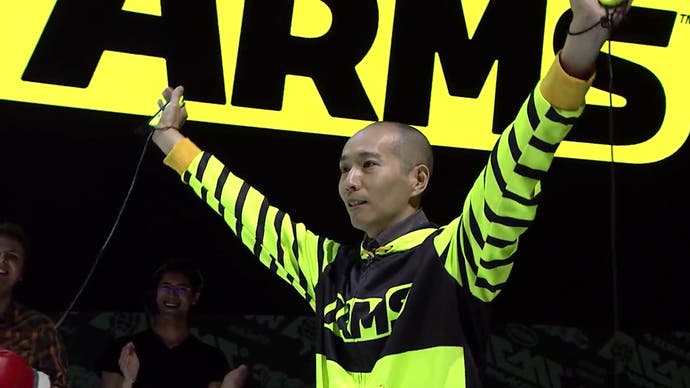
But on the other side there are people for whom Arms is so new and different that there are people struggling to get to grips with it and how best to play the game. In terms of, for beginners and for less experienced players, how to show them how to improve at the game how to get the most out of it and to make it the most fun experience for as many people as possible, that's something I'm thinking about now and how I can best put that across - so whether it's PR stuff like interviews or a training mode in the game.
So a training mode could come in a future update?
Kosuke Yabuki: That's something I'm thinking about, something I'm considering. [The most recent update] focuses on a new character and various adjustments to the balance - but for future updates adding features to the training mode could definitely happen.
And you could teach people how to do the Yabuki combo.
Kosuke Yabuki: Yeah, it could be like the last part of your training in the game!
In terms of these updates, is this a new way of making games for you? Mario Kart had tweaks but that was over a much longer period, and as this is a more competitive game it demands updates more regularly.
Kosuke Yabuki: It is new for us, really - I kind of feel like it's necessary, and it's not so much that we've changed the way we do things, it's that we've entered a different era. I worked on Mario Kart 8 Deluxe as well as Arms - those regular updates and balance adjustments, it feels like something we have to keep doing. Something that's a big consideration for us is that, in addition to supporting existing games with regular updates, we have to make new games. Working out the balance about how we do both of those things is a big consideration.
Rewinding a little to the beginning of Arms as a project. You've spoken before how it came about, but I'm curious to know how the prototyping process works at Nintendo.
Kosuke Yabuki: Within Nintendo, individual people or teams have their ideas, and also we kind of choose the prototypes that are best suited to a team's skills to work on them. An example of that being a lot of the staff who worked on Mario Kart came over as a team to work on Arms - Mario Kart 8 had a large online element, and we knew that Arms would have a large online element, so the understanding of online play would carry over.
In terms of producing that game, it's not the case that it was specifically let's make a fighting game as the first consideration. There were lots of different prototypes for online style games, and Arms was one of those that got chosen in the end. With the timing, it was in tandem with development of the Nintendo Switch - so for Nintendo Switch we asked what kind of game could we make, and within those prototypes Arms got selected. There were other prototypes of other online-centric games - those other prototypes, they weren't not chosen because they were bad ideas. Some of them had potential, so the prototypes that aren't used aren't discarded. They're still there as potential ideas for future games.
Were you on the original prototype team for Arms yourself?
Kosuke Yabuki: The original Arms team was just me and two other people. It started from a conversation about fighting games and how they're all generally side view, and could we make a fighting game where the viewpoint was actually from behind the character. The idea was, if the viewpoint was behind the character, it would be more difficult to judge the distance between your character and the opponent's character. As a kind of way of getting around that challenge, the idea of extendable attacks grew out of that. We had something to work with - and whether it'd work or not, we weren't quite sure, so rather than ponder it too much we just made a rough prototype to see what happens.
Why was it exactly that you wanted to make a fighting game from that closer perspective?
Kosuke Yabuki: I can't imagine making a standard side-on fighting game - it's something that other companies already do really well, so just to kind of repeat that, I can't really imagine us trying something like that. Something that we as development staff at Nintendo are always being told, and a point that's hammered home by Mr. Miyamoto and senior staff, is 'are you making something new? Are you making something different? Are you making something unique, that hasn't been seen before?' That consideration is something we're always thinking about. That consideration about newness cuts across all genres. In Arms' specific case it was fighting games - so really it's difficult to think exactly why we did it. It was just a conversation - a fighting game from a different perspective, how would it work? It was a light-hearted conversation, but it was something we ended up running with.
You say it's about always doing something new. On a surface level, Nintendo's been doing more new IPs - I think Splatoon was the first new character-led IP developed within Nintendo since Pikmin - and Arms came along soon after. Was that part of a movement within the company, something you were all consciously doing?
Kosuke Yabuki: Firstly, in that intervening period between Pikmin and Splatoon, there were some new IPs! Like Tomodachi Life and Rhythm Paradise, for example - I don't think that gap was so large! But around the time that Splatoon was in its early development stages, it's true to say that among the younger generation of developers at Nintendo, that desire and that idea of creating something completely new, it was definitely there.
On top of that, it's also a fact that Mr. Miyamoto, Mr. Eguchi [creator of the Animal Crossing series and deputy general manager of Nintendo EPD], Mr. Takahashi [general manager of Nintendo EPD] and other senior figures very much supported us in that. You know, there's always lots of different prototypes being experimented with and considered. For those to turn into real games, it's a huge team effort that requires a lot of manpower and a lot of talent, and without the overall support of the company, you can't achieve it. I'm grateful for the fact they didn't just say to me 'now you've got to make the next Mario Kart'. They allowed me to make Arms, and personally I'm very grateful for that opportunity.
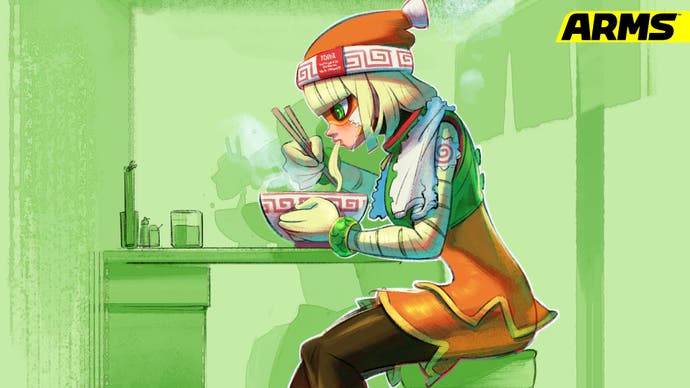
That's something that fascinated me - Mario Kart is big business, it's a huge selling series. For that team to go on to a fighting game - which is quite a niche genre, and not only that, it's an all-new fighting game - it's quite a bold move.
Kosuke Yabuki: I think with any game, whether it becomes big from a business sense - before you create it, you don't know. Even Mario Kart, some point back in the past, we didn't know it'd be such a success and go on for such a long time! In terms of now, while maintaining and supporting existing franchises like Mario Kart, it's important to try new things. Something like Arms, we're working as hard as possible to make Arms into something that fans will enjoy for a long time to come in the future. How long it continues and how successful it'll be, it's new so we don't know that just yet. In terms of the updates we're working as hard as we can on these updates, on keeping the game as fun and as interesting as possible, for as many people as possible for as long as possible.
In terms of your general philosophy of games - I think with Mario Kart you've said before there's an equal mix of skill and luck, whereas there's a bit more skill involved in Arms. Tell me how your approach to development differed in those two cases.
Kosuke Yabuki: In terms of the proportion of luck and skill, that's something I always consider when I'm developing a game. I'd agree that, compared to Arms, the role that luck plays in Mario Kart is larger. I think it's better to have variety within gaming - when developing new games my goal isn't to make them the same as Mario Kart. There's definitely a large skill element in Arms - but we don't want it to be the case where the best player always 100 per cent wins. There's still a role for luck to play in any game, I think, and in Arms, for example, you can twist your punches to the left and the right. Your opponent might move that way, they might move the other way. In the small details, there's still that luck element.
One thing we had in mind in that respect was tennis - even with one player being stronger than the other, it usually doesn't end 6-0, 6-0, 6-0. There's some degree of luck, that degree of back and forth - and that's something I had in mind when developing Arms. Another thing that's interesting about tennis - depending on the type of court and the type of surface, different players are better on some kinds of surface. And also in Arms we put that in with the different stages and the different challenges the stages pose. And some of the characters are better suited to fighting in certain stages than others. We really wanted to create that sport atmosphere in Arms - a lot of fighting games have a quite serious atmosphere. With Arms, as you can see in the stages, you have fans watching, the arenas are bright and colourful. That atmosphere was an important consideration as well.
In terms of the element of luck - it brings me to my next question. I wanted to talk about the blue shell. I'm sure you get asked about it a lot. When it comes to the probability of getting it, obviously it's increased the further back you are in a race, but is there a magic equation that determines when it appears?
Kosuke Yabuki: Something I personally really consider is the human emotion element of the play experience. So for example playing Mario Kart - if you have something that feels unfair or makes you feel frustrated or makes you angry... Everyone is different in that respect. What you will feel is unfair might be different to someone else. As far as possible we want to avoid those feelings of frustration. But because everyone is different, and it's an emotive thing, you can't pin it down with a set formula. Ultimately, in the longer term, although everyone might feel on one particular day that they're so frustrated that they're not going to play any more Mario Kart today - keeping the experience enjoyable enough so that you might feel like that today, but the next day, the next week, you'll still go back to Mario Kart and still enjoy it.
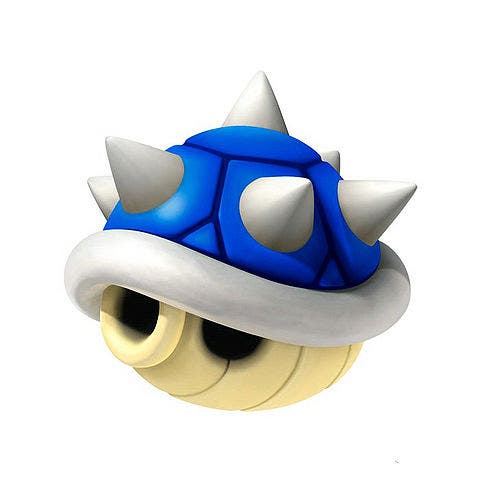
Do you think you'd ever get rid of the blue shell? I know it's part of the Mario Kart experience, but, well - it certainly makes me swear a lot when I'm playing.
Kosuke Yabuki: We're always experimenting with what new elements to introduce or what elements can be removed. We have tried - or we are trying - to see what the game's like without the blue shell. When we've experimented without the blue shell, actually it feels like something's missing. Like there's something not quite enough in the game. So for now we've kept it in. You know, sometimes life isn't fair. Sometimes in life you have something where you feel that's not right, and that's frustrating.
Yeah, it's a feeling I know too well.
Kosuke Yabuki: I think things are more interesting like that, with the blue shells of life.
Just briefly on to Mario Kart 8 itself. In my humble opinion you've kind of perfected Mario Kart. I'm curious to know where you could ever go next with it.
Kosuke Yabuki: So firstly, yeah - there really is a lot of content in Mario Kart 8, and Mario Kart 8 Deluxe. And if you're enjoying that and are satisfied, I'm happy to hear that. Definitely there's no thought at all that the Mario Kart series might end! We have lots of things already that we've come up with that haven't been used in games before. We're already of course thinking about preparations for future Mario Kart games. That's not saying that there's going to be a new Mario Kart game on the Switch! But in general the research and development process for new Mario Kart content, that's something we're always doing. Sometimes that's driven by new hardware and new technology ideas as well. The two are linked.
To go back to what I was saying earlier, with Mr. Miyamoto, Mr. Konno, they're always saying that when we're creating new games think about what new elements you can introduce, think about how you can make things fresh and exciting. And even if the new elements might at first not be liked by existing fans, or existing fans might not get it - the important thing is to keep trying new things. I'm flattered that you say with Mario Kart 8 Deluxe we've perfected Mario Kart - but there's definitely room for the series to continue with a new Mario Kart, and a new Mario Kart will appear in the future. Of course, when a new Mario Kart comes out, it doesn't mean the others disappear. I'd love fans to love all of them. 8 will still exist, 7 will still exist - if fans love every entry in the series in their own right, that's the ideal situation for us.
I feel almost bad after such an elegant answer coming back with a question like this. I said Mario Kart 8 was perfect. Well, it's almost perfect. Because it's missing Birdo.
Kosuke Yabuki: Birdo?
[At this point the translator asks the assembled Nintendo staff in the room what Birdo's called in Japan, and after we all struggle to remember I pull up on my phone this handy page I'd prepared earlier and present it to Yabuki.]
Kosuke Yabuki: Ah, yes! Catherine! I can't promise anything, but now you've mentioned it...
I'll take Birdo in Arms, that's okay.
Kosuke Yabuki: Do you really like her that much?
Well, there's a big fan club at Eurogamer. If you put Birdo in, I can guarantee all your games will get amazing reviews from now on.
Kosuke Yabuki: We'll look into it!
I'm happy with that. So, more generally speaking, how has Nintendo changed - how different is the company now to the one that you joined?
Kosuke Yabuki: It's difficult to answer how it's changed, because Nintendo is a company that's always trying to change, and is always in the process of changing. I don't have the impression of there being the kind of change that you could pin down to a certain point - it's more of a constant process. One definite example is what I mentioned earlier with the updates to Arms - we're in an era where those constant updates, that post-launch support, is very important, and that's something that's been brought about by changes in technology. It feels like we're in a different era now in that respect. And now Nintendo's moved into smart devices and mobile applications, that's also quite a big change. I think there are changes that come about because we're living in a different era and we need to adjust to that. One thing that doesn't change - and I've mentioned this quite a few times - is that impetus from Miyamoto and others to make something new, make something unique. How is the game you're making different? That's the thing that hasn't changed in my time, and it will probably never change for Nintendo.
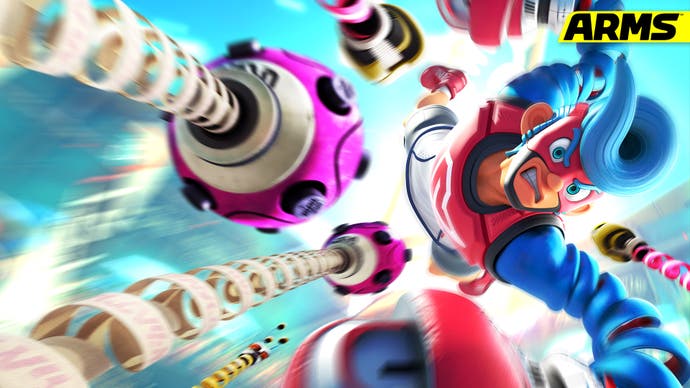
Finally - I've taken a fair bit of your time already, so thank you - I was reading an old Iwata Asks about Mario Kart 7, and it mentioned a rousing speech you gave to Retro Studios over dinner at the start of the project, about Mario Kart as a form of communication. Could you elaborate on that for me, and how it ties into your general philosophy on games?
Kosuke Yabuki: Firstly, I can't give you details of the speech I gave to Retro! It was at a dinner - the speech was just for those guys! The idea of Mario Kart being a tool for communication, though, it's something that we thought about then and that we always still think about now. That idea of it being a form of communication, a method of communication between people, it's something that Mr. Konno was always saying to me. That's an idea that came from him. Mr. Konno was always telling me and showing me that Mario Kart was a way for families, friends and now obviously if you go online, people all over the world, it's a way of bringing people together and making that interaction more fun for everyone.
That's not exclusive to Mario Kart - that idea of games bringing people together, it's a consideration of all Nintendo games. That's one of the key aims. Games that are obviously multiplayer focussed - Mario Kart, Splatoon - obviously it's true of those, but even games like The Legend of Zelda, Super Mario Odyssey, those more single-player focused games. You play them, your friends play them, you talk to each other - it becomes a topic of conversation. Even those games bring people together and facilitate communication between people. I think it's really enjoyable, like The Legend of Zelda - not just playing it on your own, it makes it even more fun.
At the time, when Mr. Konno was saying that to me, in my mind I could picture Mr. Konno being told that by Mr. Miyamoto, by Mr. Tezuka, and not just about Mario Kart. To me it's become quite an ingrained philosophy, and something I apply to all Nintendo games. It shows - I'm Japanese, but I'm here in England talking to you. We're brought together by a shared love of games, so that demonstrates that principle. I've loved games since I was a child, and now I'm lucky enough to work creating games - and I'm sure you have that same love of games. The fact that we can share that just makes me incredibly happy.
